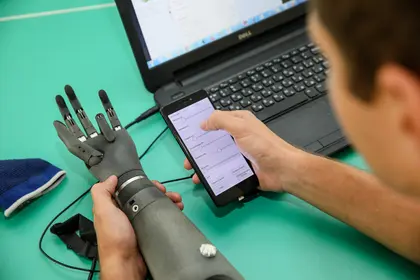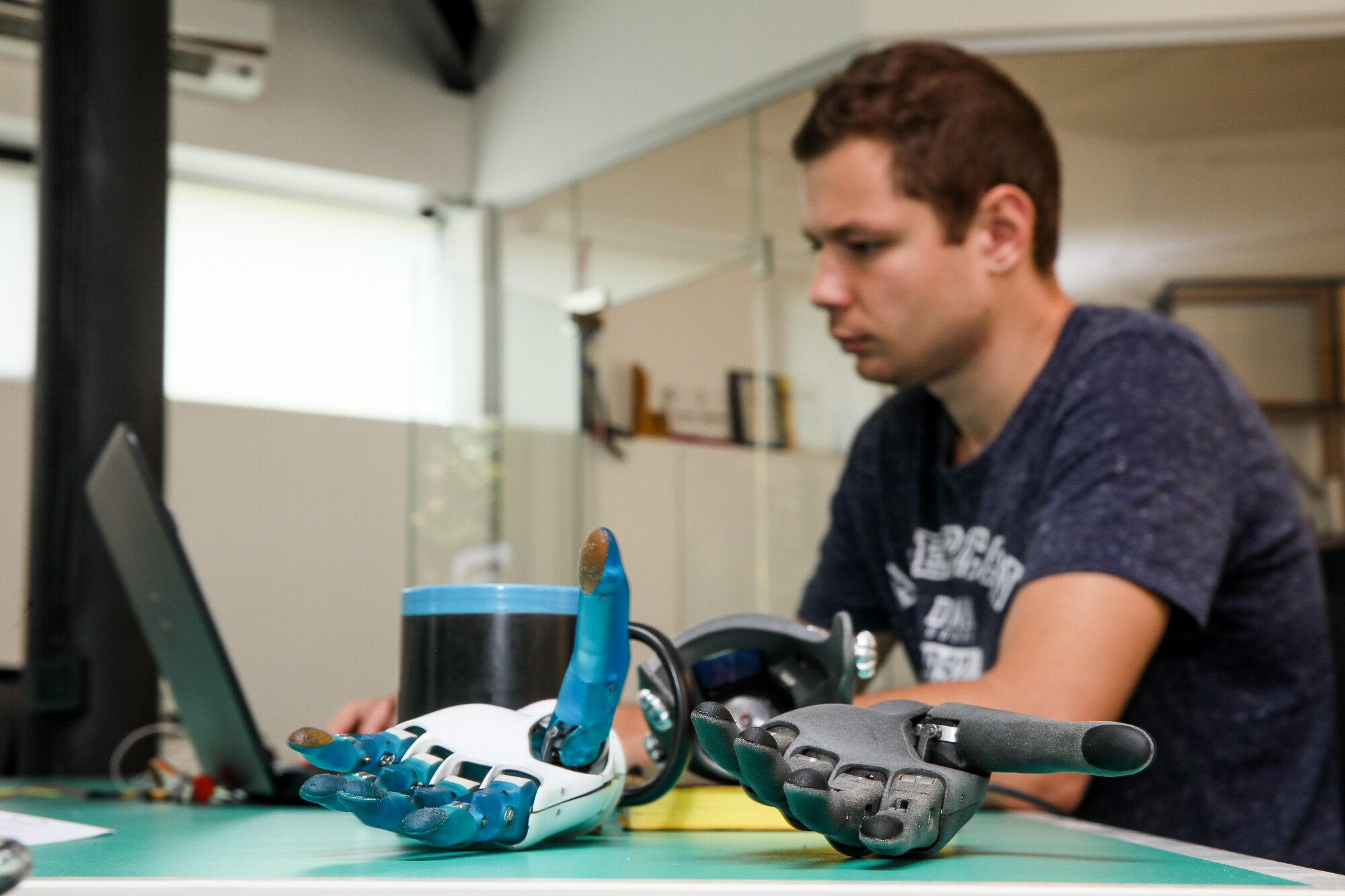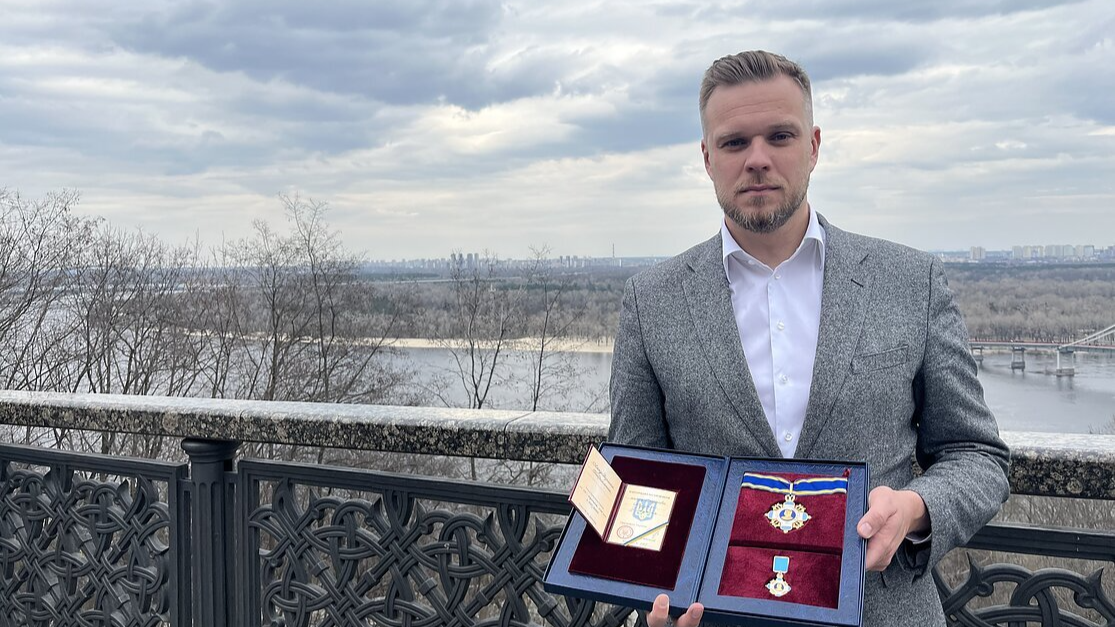More than 10,000 Ukrainians need prosthetics for their upper limbs, yet have little means to receive them.
Despite the fact that there are many prostheses on the market, they remain prohibitively expensive for most people in Ukraine. According to Ukrainian legislation, the state must provide patients who have undergone surgical amputations and with prostheses for free, but not all amputees wait until they can receive state help. If a patient does get support from the state, in most cases they will receive simple cosmetic prostheses or ones with limited function.
- Find the most current war in ukraine update in the Kyiv Post’s daily news reports published today.
- Examine the most contemporary Ukraine news that came out today.
JOIN US ON TELEGRAM
Follow our coverage of the war on the @Kyivpost_official.
Much more expensive bionic prostheses are available for free only for Ukrainian soldiers and veterans who have fought against Russia in the Donbas, Oleksandr Stetsenko, director of the prosthetic workshop Orthotech Service, told the Kyiv Post on Sept. 23.
But high-quality prostheses cost nearly $30,000-60,000, while the average Ukrainian salary is about $420 as of July 2020.
In 2017, Ukrainian entrepreneur Dmytro Gazda decided to solve this problem for those who need hand prostheses. He and his partners created a startup called Esper Bionics that develops technologically savvy and cheaper prostheses along with a software platform and a phone application.
Project’s impetus
Gazda is a medical doctor by education but, after graduating from university, he became an entrepreneur instead. As an entrepreneur, he was involved in light industry working with furniture and textile companies but never within the health industry.
During his university studies in 2006, Gazda went to Finland for an exchange program to assist in surgical operations. During his internship, he met a Ukrainian woman who lost her arm. Ten years later, he found out through Facebook that her prosthesis was of bad quality. This sparked an idea for Gazda to create a much more effective and more affordable prosthetic.
In 2017, Gazda and three other Ukrainians – Anna Belevantseva, Borys Lobanov and Ihor Ilchenko – founded Esper Bionics and started to work on a prosthesis prototype. Although they worked on the project part-time, it has been developing drastically.
In 2018, they won a startup award at the MBioS Challenge 2018. Since March 2019, the team started to work full-time on the startup’s prosthetics and soon won first place in the Vernadsky Challenge, a startup competition, receiving a prize of Hr 1 million ($35,643).
“A grant of Hr 1 million cannot cover the costs of such a development. Therefore, the project must have an investor. Initially, I was the investor,” Gazda told the Kyiv Post.
Within 13 months, the startup used up the grant, which mainly covered the prosthesis’ components, according to Gazda.
Then, in September 2020, Esper Bionics received an investment from Ukrainian venture capital fund SMRK. The startup founders would not disclose the amount of money they received from investors.
“The investment will go for beta testing: product creation and assembly line preparation. It will go toward finding new contracts with prosthetic clinics in the U.S. and toward demonstrating (the product) to them, as well as team extension,” Gazda says.
Throughout this year, Esper Bionics plans to install 20 prostheses.
How it works
If a person isn’t familiar with myoelectric technology, Esper Bionic’s prosthesis production seems like magic.
Gazda explains that the prosthesis consists of two main sections – the hand, which is made by the startup, and a socket, which is made by individual clinics for each person. The “prosthetic set” which the startup will send to the clinics will include not only the robotic hand, but muscle sensors, a battery, and a quick-release wrist unit for the socket.
The prosthesis works in the following way: The patient’s brain sends signals to the body’s muscles, which in turn initiate the prosthesis to act accordingly. Then, muscle sensors installed in the stump socket transmit them to the prosthesis.
“Now we have two sensors, but later there will be more of them, and we will determine which muscles in the forearm have contracted,” Gazda said. “Each muscle contraction will be a separate call to action.”
The prosthesis has six standard grips, but a user can customize the grips and increase the amount of grips through saving the setting on the phone application.
According to Gazda, after 10 prostheses are installed, the startup will start to connect them to a cloud platform. The robotic hand will collect data, send it to the platform, and the platform will update the algorithms for the prosthesis to work better.
“For example, the user constantly takes a cup from one angle with the same acceleration, and when this action is constantly repeated, the system assumes that he takes the cup and helps him choose a grip,” Gazda explains.
After a while, the prosthesis will be easier to operate because it will already know what a user wants to do in advance.
What’s next
Currently, Esper Bionics installed a prosthesis for one volunteer and plans to make more soon.
The startup has an application form on its website for volunteers who want to participate in the beta-testing. There are already 50 people who have applied, Anna Belevantseva, the startup’s chief operating officer, told the Kyiv Post.
The startup says that it will mainly target the U.S. market and is already negotiating with some clinics. It forecasts that its second largest market will be the European Union. However, Esper Bionics will work with Ukrainian clinics as well, and already promises special deals for Ukrainians.
In Ukraine, the price of the prosthesis will be around $6,000. In comparison, the startup is currently negotiating with U.S. clinics for the price to be closer to $16,000-$18,000.
Esper Bionics’ estimates that this prosthesis will be significantly cheaper than the standard price and plans to enter the international market by early 2022 at the latest.
Oleksandr Stetsenko, director of Ukrainian prosthetic company Orthotech Servics, says that his company consulted the startup.
“I assess the first results as positive, but only at the experimental level. There should be a batch” in order to fully evaluate their effectiveness, Stetsenko said.
You can also highlight the text and press Ctrl + Enter










